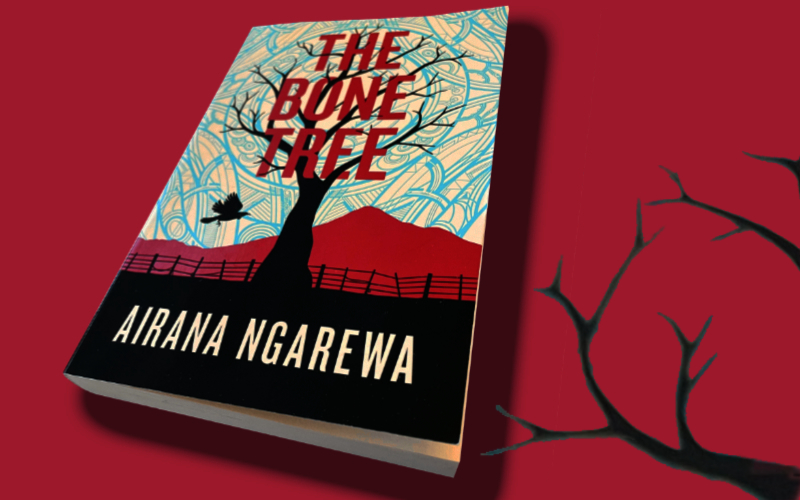I met Airana at a book festival. He’s a presence – full of youth and energy and a willingness to be in the moment. He speaks the reo in a voice that carries across an audience and compels you to listen. No wonder his debut book is so gripping. I reckon when this guy has a story, you’ll want to sit up and listen.
The Bone Tree is, yes, another story of a dysfunctional Māori family living on the edge. In this case, they’re toppling over. There is little relief and no laughs; it’s the story of the misery of a good kid – I was going to say ‘who deserves better’, but of course all kids deserve better than this. The Bone Tree is narrated by Kauri, also called Cody by fat-tongued white folk, the implication being that his name is never written down. He lives in a totally dilapidated house on a bit of land in the ‘wopwops’. When his mum dies, dad carries her body out to bury her somewhere on the land, and later the kids do the same for the dad. Kauri’s dad, a violent alcoholic, has left him with a bad shoulder and a scar under his right eye, and maybe the boy’s life will be better without him. When the little brother, Black, gets sick, Kauri is the sole caregiver with no sense of how to save him. His main focus is to hide the fact the the kids are alone, to prevent CYPS from taking Black into care. This fear of the authorities underlies the whole story and it is malignant and irrational and yet, for this child, is the bedrock of his belief. He eventually walks to the city and is given food and Māori medicine, and his brother continues to decline.
Reading The Bone Tree, I got the feeling of truth – not as a literal history, but as a representation of fear and loss and childhood trauma. There is something a bit fable-like in the house in the wops, which is only an hour’s walk to the city – a ten minute drive is hardly the wops. There is a startling miracle which really lifted my heart. There are Dickensian coincidences, though where Oliver Twist stumbles happily on his charming lost family, Kauri walks into a pub and finds his drunk uncle. The kindly shop owner turns out to be his gran, who has quite a lot to answer for, and the two people Kauri meets in church are both related. The kid tries to understand why his family has gone so off the rails but he has no rails to relate to: he takes love where he finds it because he knows nothing else. All this feels authentic for a child in very limited circumstances, entirely missing a world view. They’re in Taranaki and the maunga that looms over all life there is barely mentioned, symptomatic perhaps, of a child who doesn’t see much beyond what is directly in front of him.
The colour of the house chipped and peeled all ’round the outside and everywhere it didn’t chip and peel, it faded, except where the roof provided shade and where the earth crept up on it at the bottom. It was built from long lengths of timber; each piece a different age, a different width and a different tree; every length of timber more a cousin than a brother.
Evocative writing of a place in which I really didn’t want to dwell.


“The Bone Tree” captivates with its poignant portrayal of a Māori family’s struggles, delivering a raw and authentic narrative. Ariana’s storytelling skillfully navigates themes of fear, loss, and childhood trauma through the lens of Kauri’s compelling journey. The Dickensian twists and fable-like elements add layers of complexity, making the narrative both gripping and emotionally resonant. A powerful debut that explores profound human experiences, “The Bone Tree” is a must-read, showcasing Ariana’s talent in capturing the depth of truth in storytelling.
LikeLike